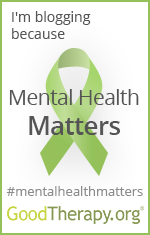It’s May 30th, the last day of Mental Health Awareness Month, and lately I’ve been reminded of why I went into this field. My 15 year-old dog is still alive today (amazingly) but for a couple of weeks this month I was sure she had only a couple of days left in her. She began leaning to one side, wandering aimlessly, falling, and winding up in the corner of some room in the house crying, or worse yet, splayed out on legs that couldn’t hold her up anymore. She’s better now, somehow, possibly because her brain has atrophied enough to compensate for any swelling that was making her act strangely. And I’m better. She’s been through thick and thin with me for the last 14 years… an amazing lightness of being who has watched me through it all, and offered sweet companionship regardless of my moods or any inability I might have had to give in the moment. So, I grieved, and I watched myself feel angry at how helpless I was to the incessant emotions I felt.
I’ve worked in the hospice field for several years as a grief counselor in addition to the work I do privately, and although I have helped many, many people through their grief I am never “ready” for my own, and never feel that because I’m in this field I can “manage” my own grief more easily. Grief is grief, and by it’s nature we don’t have any control over the process. We don’t have the ability to pre-empt the process, predict what we’ll feel, and nip it in the bud to make our day easier, or more comfortable, or more enjoyable. I was told by a mentor some years ago that life is inherently bittersweet. There is no Shangri-La of happiness that we can attain, or some plateau we reach, finally, to tell us that we’ve arrived and there will be no more suffering. It is the nature of life to have hardship, suffering, and conversely times of great joy and contentedness. And as a human who helps other humans, I find myself often in the position of feeling what my clients are feeling, albeit because of completely different scenarios. I have enough training and experience to be able to separate my experience from my client’s, and this is always helped by a personal practice in mindfulness meditation. Still, the rawness I feel some days and the internal dance I need to do to stay aware of the difference between what’s mine and what’s my client’s is an intense (and rewarding) part of the journey. Ultimately, understanding humanness becomes a two-way street: the human being(s) sitting in front of me, and their complex ways of understanding and making meaning of themselves and the world around them are a practice in helping me to understand my own humanness. And, the more I can understand my own humanness, the more I can understand others. This lesson has been shown to me over and over again, and for everyone’s sake I hope it continues to show up in the work I do with people.
So, my work in the mental health field is about so much more than “mental health,” and about so much more than “resolving issues,” or “repairing,” although these can be essential components of my client’s goals. Because we’re so much more than beings with issues that need resolving, or repairing, or fixing. We are all struggling to understand both what’s inside us and what’s outside us, and if we can reach the point of understanding others, so much of what feels challenging in the world could evolve into synergy, rather than dissonance. The synergy that happens when our minds can open up to another’s experience, even in the face of not completely understanding it, is what can help all of us to feel OK with the things that have felt like a struggle.
If Mental Health with a capital M and H were instead replaced with something more clever and simple and definitive of getting our humanness (whatever that would be), we may be more apt, as a nation, to see “Mental Health Services” as something we could all use at certain times in life, rather than something we use when we’re “crazy” outcasts who need fixing in order to fit into society. Of course, it’s more than the title, and if I help you understand yourself, you can help others to understand themselves, and they, in turn, will understand you.

The post Why Mental Health Is Like a Jumbo Shrimp appeared first on Amy Winchester, MA, LPC.

















